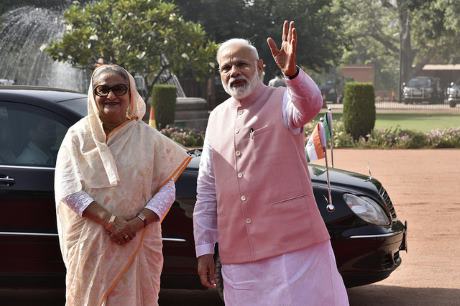Bangladesh, India sign cooperation agreements
10 April 2017
Three nuclear energy agreements between Bangladesh and India, including one regarding nuclear power projects in Bangladesh, have been signed during an official visit by Prime Minister Sheikh Hasina of Bangladesh to New Delhi.
 |
| Modi, on the right, welcomes Hasina at a ceremonial reception in New Delhi on 8 April. (Image: MEA) |
According to India's Ministry of External Affairs (MEA), an agreement between the two countries' governments on cooperation in the peaceful use of nuclear energy was signed by Bangladesh's Ministry of Science and Technology and India's Department of Atomic Energy (DAE).
The chairmen of the two countries' nuclear regulators - the Bangladesh Atomic Energy Regulatory Authority and India's Atomic Energy Regulatory Board - signed an agreement on the exchange of technical information and cooperation in the regulation of nuclear safety and radiation protection.
The final nuclear agreement listed by the MEA was an inter-agency accord between the Bangladesh Atomic Energy Commission and the DAE's Global Centre for Nuclear Energy Partnership (GCNEP) on "cooperation regarding nuclear power plant projects in Bangladesh". The GCNEP is a nuclear research and training centre currently under construction near New Delhi.
A total of 22 agreements and memoranda of understanding, including those related to nuclear energy, were exchanged during Hasina's visit from 7 to 10 April. Speaking at a joint press conference, India's Prime Minister Narendra Modi said the two premiers had held "productive and comprehensive discussions" on partnership between their countries.
"We agreed that the agenda of our cooperation has to remain focused on purposeful action. We specifically looked at charting new avenues and tapping fresh opportunities in advancing our relationship. We want to build cooperation in new areas, especially some high-technology areas, that have a deeper connect with the youth in both our societies. These would include working in the fields of electronics, information technology, cyber security, space exploration, civil nuclear energy, and other areas," he said.
Bangladesh's energy plans include two large Russian-built VVER pressurised water reactors to be built at Rooppur in the Pabna district, about 160 km north of Dhaka. Construction of the first unit is expected to be begin later this year, entering commercial operation in 2023 or 2024, with the second unit following a year later.
India's 22 operating nuclear units include two Russian-supplied and built VVERs at Kudankulam in the state of Tamil Nadu. Kudankulam 1 entered commercial operation in December 2014 and on 6 April this year all responsibility for the unit was formally handed over to Nuclear Power Corporation of India Ltd. Kudankulam 2 began commercial operation on 3 April. Two further VVER-1000 units - Kudankulam 3 and 4 - are to be built at the site in a second construction phase, with more units to follow.
Researched and written
by World Nuclear News